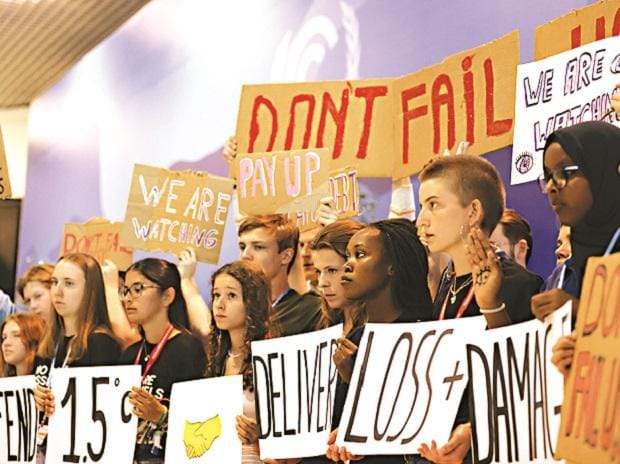Extended negotiations during the Conference of the Parties (COP27) at Sharm el-Sheikh in Egypt have resulted in a landmark decision to create the first-ever ‘Loss and Damage Fund (LDF)’ to compensate developing nations for harm caused by climate extremes. But there was little progress on other key issues, such as India’s call for “phasing down” all fossil fuels.
The final implementation plan released by the UN — after the climate talks got stretched by nearly three days — stated: “It welcomes the consideration, for the first time, of matters relating to funding arrangements responding to loss and damage associated with the adverse effects of climate change, including a focus on addressing loss and damage.”
The UN further stated it welcomes the “adoption of decisions on matters relating to funding arrangements responding to loss and damage associated with the adverse effects of climate change”.
Finer details on the LDF were, however, missing, especially regarding funding. The text said “institutional arrangements of the Santiago network for averting, minimising, and addressing loss and damage associated with the adverse effects of climate change to enable its full operationalisation”. Not many rich countries supported setting up such a fund, despite several developing economies, especially African and South Asian nations, clamouring for it.
It was only the European Union that made a historic intervention on the penultimate day of the negotiations, agreeing to provide financial help to poor countries facing climate extremes.
India’s representative, Union Minister for Environment, Forest and Climate Change Bhupender Yadav, welcomed the decision to establish the LDF. Addressing the concluding plenary, Yadav said: “You are presiding over a historic COP where an agreement has been secured for loss and damage funding arrangements, including setting up a loss and damage fund. The world has waited far too long for this.
We congratulate you on your untiring efforts to evolve consensus.”
Yadav further said: “We also welcome the inclusion of transition to sustainable lifestyles and sustainable patterns of consumption and production in our efforts to address climate change in the cover decision.”
Though India supported the final implementation plan, its key demand to include all fossil fuels for phase down was not considered. The Indian delegation, citing the Sixth Assessment Report (AR6) of the Intergovernmental Panel on Climate Change (IPCC), said there is a “need for phase down for all fossil fuels, in the context of a clean energy transition”.
The final text remained unchanged despite severe protests by developing nations. The final draft noted: “(It) encourages the continued efforts to accelerate measures towards the phase down of unabated coal power and phase out and rationalise inefficient fossil fuel subsidies, in line with national circumstances and recognising the need for support towards just transitions.”
Shruti Sharma, senior policy adviser at IISD, said, “It is disappointing that COP27 did not build on the COP26 statement to deliver a stronger message on the phase out of all fossil fuels. COP26 asked parties to, among other things, transition to low energy systems through the phase down of unabated coal phase down.”
The negotiating text during Glasgow COP26 had also used a similar language with onus on coal, and none on oil or gas.
Yadav, during his intervention at the plenary, also talked about the work programme on “just transition”. “For most developing countries, just transition cannot be equated with decarbonisation, but with low-carbon development. Developing countries need independence in their choice of the energy mix, and in achieving the sustainable development goals,” he said.
Ulka Kelkar, director, climate programme, WRI India, said the “just transition” programme by the COP27 would be for countries like India that have a large workforce in fossil fuel-dependent sectors.
She, however, added: “Just as the G20 communique made a strong statement against war, the final decision from COP27 could have made a powerful commitment in the current energy crisis to phase out all fossil fuels. Instead, it only called for a diversified energy mix, implicitly accepting the continued expansion of gas.”
Note:- (Not all news on the site expresses the point of view of the site, but we transmit this news automatically and translate it through programmatic technology on the site and not from a human editor. The content is auto-generated from a syndicated feed.))




That is a really good tip especially to those new to
the blogosphere. Simple but very precise info… Thanks for sharing this one.
A must read post!